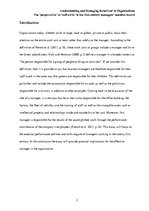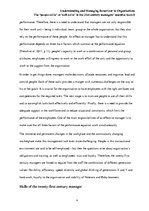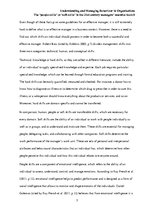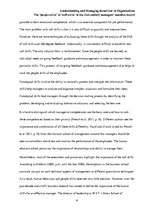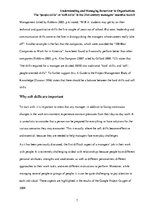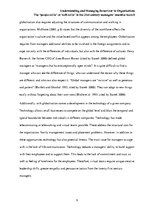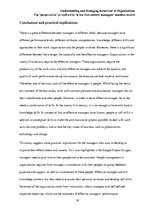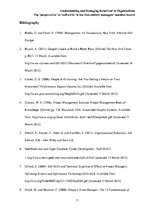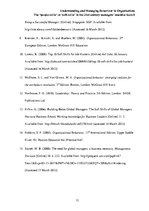-
Behavior in Organizations
| Nr. | Sadaļas nosaukums | Lpp. |
| INTRODUCTION | 2 | |
| MANAGERS AND EFFECTIVE MANAGERS OF THE TWENTY-FIRST CENTURY | 3 | |
| SKILLS OF THE TWENTY-FIRST CENTURY MANAGER | 4 | |
| WHY SOFT SKILLS ARE IMPORTANT | 7 | |
| THE CONCLUSIONS AND PRACTICAL IMPLICATIONS | 10 | |
| BIBLIOGRAPHY | 11 |
Conclusions and practical implications
There is a great difference between managers in different fields, because managers have different performance levels, different attributes, competencies, knowledge, different skills and approaches to their work, organisation and the people involved. Moreover, there is a significant difference between the average, the successful and the effective managers. Organizations in the twenty-first century require the effective managers. These organisations require the productivity of the work units, and only effective managers can achieve the quantity and quality of work performance taking into account the resource use both material and human. Therefore, one of the main tasks of the effective managers is people. While facing the hectic environment of the day-to-day work with constant pressure and disturbance, managers rely on their subordinates and other people. However, in order to be an effective manager, he or she needs a combination of skills. In the twenty-first century, it is not enough to have only hard or knowledge skills. It is essential that an effective managers have human, people or soft skills in addition to conceptual skills to make the communication process possible, to deal with work activities and problems, and to face the key issues of business, such as globalisation, technology and change.
…
Behaviour in Organisations: The ‘people skills’ or ‘soft skills’ in the 21st century managers’ essential toolkit Organizations today, whether small or large, local or global, private or public, focus their attention on the entire work unit or team rather than solely on the manager. According to the definition of French et al. (2011, p 18), these work units or groups include a manager and his or her direct subordinates. Holy and Newman (2008, p 3) define a manager in a broader context as “the person responsible for a group of people or things or activities”. If we consider this definition, then it is possible to say that business managers are therefore responsible for their staff much in the same way that parents are responsible for their children. This definition can go further and include the accountants responsible for an audit as well as the politicians responsible for a ministry in addition to other examples. Coming back to the discussion of the role of a manager, it is obvious that he or she is also responsible for the office building, the factory, the fleet of vehicles, and the training of staff, as well as the intangible assets such as intellectual property and relationships inside and outside his or her unit. Moreover, this manager is responsible for the results of the accomplished work through the performance contribution of the company’s employees. (French et al. 2011, p 18). This essay will focus on the essential performance abilities and skills require of managers working in the twenty-first century. In the conclusion the essay will provide practical implications for the effective manager in the organisation.


